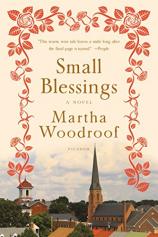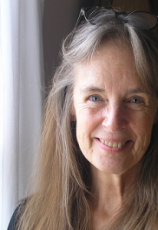Interview: August 13, 2014
Martha Woodroof's debut novel, SMALL BLESSINGS, introduces readers to Tom Putnam, a college English professor who is stuck in an existence that hasn't changed in decades. Suddenly, he finds that his life takes on new light and expanded possibilities when everything around him is upended by what first appears to be a terrible tragedy. In this interview, Woodroof talks to Bookreporter.com’s Amie Taylor about what inspires people to venture out of their comfort zones and pursue happiness, and how love can hold together even the most diverse groups. She also opens up about why she can’t choose favorites when it comes to her characters and the reason she prefers country living to city life.
Bookreporter.com: What was your inspiration for SMALL BLESSINGS, your debut novel?
Martha Woodroof: I’m interested in the amount of courage it takes for a person to risk changing, even when the change is for the better. SMALL BLESSINGS actually came from the idea of a certifiably nice guy who’s stuck in a very limited life because he is a nice guy; but then --- presto! --- he has an opportunity to risk being happy. Will he go for it, or will he stay in his comfort zone?
BRC: When SMALL BLESSINGS begins, it appears that Tom Putnam will be stuck in his dreary life with Marjory and her idiosyncrasies forever. What made you decide to emancipate him so early on in the book?
MW: For me, any kind of change (for better as well as for worse) is challenging. Life just never stands still, so how we respond to change really determines the quality of the life we live. It's hard to imagine greater changes in Tom's life than the ones he's presented with. They may happen early in the novel, but not early in Tom's life. The novel just happens to pick up at the point that this change happens.
BRC: Even though Marjory was only in the picture for a short time, I just wanted to shake her and tell her to pull herself together. Do you ever get frustrated with your own characters and want to offer them advice?
MW: I think Marjory is way beyond being able to pull herself together. As someone who’s had her own bouts with depression (nothing in Marjory’s league), I think I felt more empathetic with her than impatient. I love that Marjory keeps trying to get better and keeps believing she can. But I also love that you had a completely opposite reaction. To me, that means Marjory is as real as someone living on the page can be.
As to my characters in general, I am old enough (67 --- and don’t you dare think that “old” is a pejorative rather than simply a descriptive adjective!!!!) to be well aware that we humans are inherently flawed. To me, learning how to get out of our own way is a lifelong process. I see SMALL BLESSINGS as a constellation of characters, each of whom makes significant progress in that direction. So from my position on the sidelines of their lives, I found myself cheering these people on rather than feeling frustrated with them. But again, to each reader, her/his own reaction!
BRC: Not only is Tom freed from the bondage of Marjory, so is Marjory's mother, Agnes Tattle. Would you say that Tom and Agnes were the strong ones in the trio, or was it really Marjory who was running the show in a roundabout way?
MW: I think they’re all three pretty strong people. Tom and Agnes are Marjory’s caretakers, but it’s because she’s ill rather than because she’s manipulative. That, to me, is an important distinction. All three characters exhibit a kind of quiet courage that I greatly admire. As to who's running the show, I would posit that the show is more bumbling along than being run!
BRC: You've managed to tie the lives of Tom, Agnes, Russell, Rose and Iris in ways that it would be difficult for any of them to extricate themselves from the group. What is it that really holds them together when they're all so different?
MW: In a word, love.
I think there are all kinds of love, as well as all kinds of vulnerability. Tom, Agnes, Russell, Rose and Iris all have the ability to respond with kindness to each other’s needs. And to me, kindness is love in action.
BRC: It seems that you have no qualms about putting your characters through the wringer at every possible opportunity. Did you ever want to give them a break, or did you enjoy ratcheting up the odds against them?
MW: Oh golly, maybe it's because I've led such a rackety life myself, but I felt as though I was just letting these people's lives unfold rather than making things difficult for them. In my experience, real life is just flat-out, non-stop challenging; one dadgum thing after another.
BRC: SMALL BLESSINGS is full of unexpected twists and turns that simply launch themselves at the reader out of nowhere. Did you plan all of those surprises ahead of time, or did they gradually unfold during the writing process? Have you always had such a wild and wicked imagination?
MW: I taught myself to write novels by writing novels. For years, I've been getting up early to have a couple of hours to write fiction before diving into the world of public radio. I don't think I could plan a story out if someone said my next cup of coffee depended on it! Instead, I sit down at the computer, dive into my imaginary world, and see what its inhabitants are up to now.
As to the wild and wicked imagination, I have to again refer to my age and my rackety life. I've met a lot of people and done a lot of different things. As to what happens to the characters in SMALL BLESSINGS, I'll leave it to you to guess where experience ends and imagination begins.
P.S. None of the characters in SMALL BLESSINGS are actually based on anyone I've ever known. Really.
BRC: Is there any character in the novel you identify with more closely than the others? Was one easier to write than the others?
MW: I, like Rose, have worked in a college bookstore; I'm bossy like Agnes; I'm a substance abuser like Iris. But otherwise the characters are wholly themselves. And I found them all equally pleasurable to write. They became, in a way, my most fun friends, and I missed their daily company when the novel was finally done.
BRC: How does the concept of small blessings factor into your life? Do you take pleasure in the small blessings that occur?
MW: Yes! But it's more of a habit I acquired in recovery, rather than a talent I was born with.
BRC: Your bio says that you live in the Shenandoah Valley with cows as your nearest neighbors. Do you find that the solitude helps or hinders your writing?
MW: I love the home I've made with my husband, Charlie. We've been in the same house for over 10 years, the longest I've ever lived anywhere since I left for boarding school at 16. Home for me is a combination of the house itself, the land around it, our lovely country neighbors and, of course, our cat, who's an attitude on four paws.
I do, however, think part of the attraction of quiet country life is the slam-bang nature of my professional life. I'm still a working journalist. Most days, after my morning writing time, I go into my office at WMRA Public Radio where there's plenty of hubbub. Then, at the end of a very busy day, I'm happy to go home, weed the garden, cook supper and watch a Washington Nationals baseball game with Charlie.
As to whether living in the country helps or hinders my writing, I would say neither. Writing, for me, requires a calm head. But I seem to be able to achieve a calm head in a coffee shop as effectively as in my home office.
If the question is do I prefer living in the country, the answer is yes! I'm not sure Charlie and I are civilized enough anymore to live in the city.
BRC: What are you working on now, and when might readers expect to see it?
MW: I'm working on a couple of novels with an intertwining cast of characters (including some from SMALL BLESSINGS). I'm on a second draft of one of them. I'm hoping to have it done in six months at the most. The timing of its appearance in bookstores, however, is up to a publisher.









